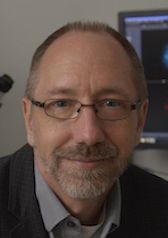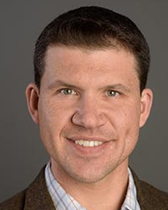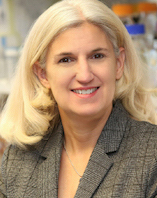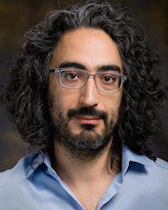
Jason Brickner
Affiliation(s): Cell Biology of Transcription, IBiSj-brickner@northwestern.edu
Lab Website
The Brickner lab studies how cells control the position of genes within the nucleus, and how gene positioning affects gene expression.

j-brickner@northwestern.edu
Lab Website
The Brickner lab studies how cells control the position of genes within the nucleus, and how gene positioning affects gene expression.

l-chen@northwestern.edu
Lab Website

jenna.christensen@northwestern.edu
Lab Website
The Christensen lab uses comparative biology and biochemical reconstitution to both understand fundamental principles behind intracellular transport and discover exceptions to these ‘rules’.


juan.du@northwestern.edu
Lab Website
The Du lab studies the molecular mechanisms underlying chemosensation and temperature sensation.

dfoltz@northwestern.edu
Lab Website


songi.han@northwestern.edu
Lab Website

bmh@northwestern.edu
Lab Website
The Hoffman lab studies catalytic mechanisms of metalloenzymes through the development and implementation of ENDOR spectroscopy, NMR, and EPR.

horvath@northwestern.edu
Lab Website
The Horvath lab studies signal transduction and gene regulation in innate immune responses to cancer and viruses.

nkamat@northwestern.edu
Lab Website
The Kamat lab studies artificial cell/protocell models, membrane biophysics, emergent behaviors from synthetic membranes, and membrane stress-sensing.

n-kelleher@northwestern.edu
Lab Website
The Kelleher lab studies enzymology of natural product biosynthesis, mass spectrometric-based studies of the "Histone Code," and development of Fourier Transform Mass Spectrometry (FTMS) for Top Down Proteomics.

yevgenia.kozorovitskiy@northwestern.edu
Lab Website
The Kozorovitskiy lab's goal is to accelerate the understanding of neuromodulation and plasticity in the vertebrate brain.

laura.lackner@northwestern.edu
Lab Website
The Lackner lab studies dynamic interplay between the intracellular distribution of mitochondria and cellular function.

hojoon.lee@northwestern.edu
Lab Website

j-leonard@northwestern.edu
Lab Website
The Leonard lab studies engineering cellular and biomolecular technologies for human health using synthetic biology and systems biology.

wei.lu@northwestern.edu
Lab Website
The Lü lab studies the molecular mechanisms underlying chemosensation and temperature sensation.

jblucks@northwestern.edu
Lab Website
The Lucks lab studies unraveling the RNA sequence/structure/function code for biology, medicine, and biotechnology.

john-marko@northwestern.edu
Lab Website
The Marko lab studies protein-DNA interactions, chromosome structure, and dynamics.

The Mondragon lab studies crystallographic elucidation of structure-function relationships of protein-nucleic acid interactions, and spectrin structure/function.

r-morimoto@northwestern.edu
Lab Website
The Morimoto lab studies the heat-shock response and the transcriptional regulatory mechanisms of molecular chaperones.

motter@northwestern.edu
Lab Website


m-prakriya@northwestern.edu
Lab Website
The Prakriya lab studies the molecular and cellular mechanisms of intracellular calcium signaling.

i-radhakrishnan@northwestern.edu
Lab Website
The Radhakrishnan lab studies the transcription factor interactions in eukaryotic gene regulation using biological NMR spectroscopy.

grocklin@northwestern.edu
Lab Website
The Rocklin lab develops high-throughput methods for protein biophysics and protein design, with a focus on protein therapeutics.

amyr@northwestern.edu
Lab Website

smriti.sangwan@northwestern.edu
Lab Website
The Sangwan lab focuses on understanding the molecular basis of protein quality control.

k-satchell@northwestern.edu
Lab Website

krishna@northwestern.edu
Lab Website
The Shrinivas lab’s vision is to understand, and subsequently engineer, how biomolecules self-organize in cells to enable the diverse functions of life.

ercek@northwestern.edu
Lab Website
The Tullman-Ercek lab studies the engineering of membrane proteins and protein membranes.

k-tyo@northwestern.edu
Lab Website
The Tyo lab investigates the regulation and biochemistry of metabolic networks, and toward manipulating the metabolic network to increase production of drugs, fuels, and chemicals.

reza.vafabakhsh@northwestern.edu
Lab Website
The Vafabakhsh lab studies the development of methods for quantitative hierarchical characterization of synaptic players at different length scales.

s-wignall@northwestern.edu
Lab Website
The Wignall lab studies the mechanisms that promote accurate chromosome segregation during oocyte meiosis.

frances.yap@northwestern.edu
Lab Website
The Yap lab studies the biochemical and structural basis of mRNA translation and antibiotic resistance.

joshua.ziarek@northwestern.edu
Lab Website
The Ziarek lab is exploring the protein structure/function/dynamics relationship, molecular mechanisms of allostery, and the rational design of molecular therapeutics and tools – with a long-standing interest in G protein-coupled receptors (GPCRs).